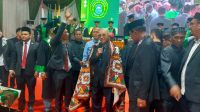Penulis: Desi Sari Ayuni Mahasiswi Institut Agama Islam Negeri Langsa
Islamic economics adheres to values and ethics that are directly related to sharia principles in conducting muamalah transactions, which carry the concept of providing equal benefits between two parties and imposing losses on the two parties concerned, not only burdening one party. party only.
This is different from conventional economics which has the principle of seeking the maximum profit by using any means and ignoring the justice of others in its competition in the economic world. This certainly gives unrest to the Muslims who take part in these activities.
So that sharia economics answers all the concerns of Muslims in carrying out economic activities without any worries and worries, because it is clear that in sharia economics it is forbidden to use methods that are not true, far from being maysir, gharar, haram and usury, while Conventional economics does not recognize this.
Based on Islamic teachings, economics is one of the things that is discussed and has rules. Sharia economics is an economy that is carried out based on the principles of Islamic law and forbids usury, in accordance with what has been determined based on the verses in the Qur’an. Islamic economics is an economy based on divinity.
Islamic economics starts from Allah, aims at the end to Allah, and uses facilities that cannot be separated from
Allah’s Shari’a. According to Islam, economic activity is part of a comprehensive life, based on values derived from the Qur’an and hadith which are applied to the relationship to Allah and to humans simultaneously.
These values are the source of Islamic economics. So that economic activity is bound by Islamic values, including
meeting needs. Indonesia has developed and changed very rapidly from time to time. Of course, this does not escape the
impact of the legal sector which has a major influence in transforming the development of the Islamic economy
in Indonesia. The support that comes from the legal sector has been proven by issuing laws and regulations in the
field of sharia economics, including the existence of law regulation No. 3 of 2006 which discusses the granting of full authority to the Religious Courts to directly oversee sharia economic dispute cases in Indonesia.
In addition, the government has also issued other policies regulated in Law No. 19 of 2008 regarding State Sharia
Securities and Law No. 21 of 2008 which discusses the Islamic banking sector which reflects how solid the foundation is with the legal basis of Islamic Economics in Indonesia. On a practical level, it is clear that the presence of Islamic financial institutions in recent times often indicates a development that is so advanced and drastic. (Mujiatun Ridawati, 2021: 45).
This development is based on the increasing awareness of most Muslims to carry out the regulations stipulated by sharia in a kaffah manner. This development certainly provides a new
color and great hope for business actors in running a business that is not only oriented to the value of profit alone,
but also in accordance with the priorities of sharia law which promises to fulfill spiritual needs.
In 2006, Bank Indonesia issued a policy for the Islamic banking industry, namely PBI No. 8/3/PBI/2006. In this regulation, it has been noted how the implementation of office channeling for Islamic Banking in Indonesia is recorded. This policy is a clear proof of the new innovations issued to break through the global economy and
develop a broad-scale Islamic economy . (Ahad Maulidiizen, 2017: 16).
The issuance of policies related to Office
Channeling relies on the ease of access provided to the public in transacting using Islamic Financial Institutions.
With the creation of such a sophisticated system, Islamic banks do not need to expand their network or open Sharia Business Units (UUS) in various parts of Indonesia, this is done so that expansion costs are more efficient.
This office channeling policy is also intended to direct banking activities to be able to support national economic
growth through sharia banking activities. The implementation of office channeling will make it easier for people to carry out sharia transactions. Currently, the global community is starting to look at Islamic economics to be applied in the banking system. This is due to the condition of world economic growth from 2015 to 2019 which has decreased, but it is different from areas that apply Islamic banking instruments.
Islamic economics has three basic principles, namely monotheism, morality, and balance. This is what
makes the Islamic economy ogled by the world, both Muslim countries and non-Muslim countries. First, in terms
of principles, it has been explained above that Islamic economics comes from Allah, which has been written in the Qur’an.
Aqidah here is not just a complement or a name but is true for the welfare of humans. Then morals, in Islamic economics, of course all regulations and policies must look at the aspects of Islamic morals such as prohibiting cheating, speculation and individualist morals who only care about themselves and ignore healthy economic ethics that are for the welfare of the people.
Islamic economics is attractive because there is a tendency in economic development in the global era to pay more attention to ethics in economic activity (Kholis, 2008: 2). The Islamic economy began to be in great demand by all groups, from the upper, middle and lower classes. The reason is because the current Islamic economic system is considered a profitable economic system and provides justice for all parties. The attraction also comes because of the weakness in the conventional economy that is currently applied.
Its weakness mainly lies in its secular paradigm which separates positive and normative economics, the absence of a strong relationship between micro and macro economics, the neglect of moral and ethical values in its descriptive and
predictive functions. The Islamic economic system is different from conventional economics, the Islamic economic system applies the profit-sharing principle while the conventional economic system applies the interest principle. With the profit sharing principle, Islamic banks will get a share of the real profits of customers who use the funds. Islamic banks will also share in part or even all losses from businesses run by members. Whereas in the conventional economic system the dominant advantage is the owner of capital. The development of sharia
economy is based on the condition of Indonesia itself. Indonesia is one of the countries with high Islamic economic growth. Judging from the banking sector, the development of the Islamic economy in Indonesia is very encouraging . (M.B Anto Hendrie, 2003: 112). According to Bank Indonesia, in 2022, Islamic banks in Indonesia will grow rapidly between 40-60% per year.
And in 2022 there will be 14 Sharia Commercial Banks (BUS), 20
Sharia Business Units (USS), and 164 Sharia People’s Financing Banks (BPRS). The development of Islamic banks in Indonesia is also not comparable to the public’s understanding and knowledge of the Islamic banking operational system. Although Islamic banks have developed from year to year, many people do not know what and how Islamic banks carry out their operational activities.
The presence of Reform in Indonesia, especially since the 1998 SI-MPR, the term People’s Economy has become a trend topic that is widely discussed as a sign that the economy must be implemented in Indonesia, why
not? This is based on the fact that the people’s economic system upholds democracy and is guided by the people’s
economy.
Of course, thinkers and connoisseurs of independence do not stop thinking, why was the People’s Economy chosen? Not the People’s Economy and the Pancasila Economy. The factor is because if attributing the people’s economy will have a Communist connotation like the system implemented in the RCC (People’s
Republic of China), then why not choose the Pancasila economy? That’s because this economy has been implemented in the new order and has been proven to fail. Bung Hatta as the founding father of this country has laid the foundations of the Islamic economic system in the basis of the Indonesian state, which is now known as a people’s economy, which used to be called cooperative economy, then people’s economy and Pancasila
economy, which is located on the foundation of the Indonesian state, namely Pancasila.
In Pancasila, five basic characteristics have been mentioned, namely divinity, humanity, unity, deliberation and social justice. All of that is sourced from Islamic teachings. Therefore, the term populist economy as a form of people’s business is considered to be most in line with the concept of empowering Muslims which emphasizes the principles of justice, honesty, openness (transparency), responsibility and deliberation.
This system is still very useful for development, especially for the Indonesian nation, where most of the people are still in need.” A populist economic system that puts forward various principles for the benefit of the people, is considered the most relevant. Because, apart from taking sides with the people, it also has a mission of togetherness, freedom, justice, and humanity.









